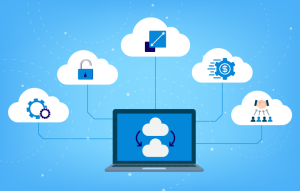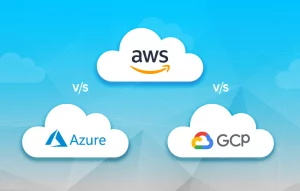Innovation and adaptability have become fundamental requirements for every business to keep up with the digitally dynamic world. Organizations are choosing cloud migration and undertaking platform modernization to drive operations, scalability, and cost optimization. However, migrating to the cloud is not enough. Integrating artificial intelligence is also imperative to keep business stay agile, data-driven, and future-ready.
AI offers matchless insights, automation, and efficiency by helping organizations modernize their platforms and move workloads seamlessly with minimum disruption to maximize value.
By leveraging cloud migration services, businesses can ensure a structured and efficient transition to the cloud while incorporating AI for enhanced performance and innovation. These services not only streamline the migration process but also provide the infrastructure needed to integrate AI effectively, creating a foundation for sustained growth and future scalability.
This blog will share a strategic approach to the incorporation of AI in cloud migration and platform modernization to enable smooth transition and prepare your business for success and innovation.
The strategic role of AI in cloud migration
Artificial intelligence is now a key part of cloud migration efforts. It is no longer just an extra feature. Apart from automation, AI introduces intelligence and foresight into complex processes. AI analyzes large data volumes and helps organizations make intelligent decisions for migrating workloads, cost efficiency and performance.
How AI helps with cloud migration
- Predictive analytics provided by AI helps businesses assess the impact of migrating applications and data before the move.
- It mitigates risks, reduces downtime, and ensures effective resource allocation in the cloud environment.
- AI-powered tools automate routine tasks such as application assessment, dependency mapping, and infrastructure management.
- This automation accelerates migration and minimizes human errors.
- AI plays a critical role in real-time monitoring during and after the migration process.
- AI identifies performance bottlenecks, forecasts future capacity needs, and recommends optimization.
- AI integration ensures the cloud environment aligns with business objectives.
- The strategic use of AI in cloud migration enhances agility, scalability, and operational efficiency.
- It leads to long-term success in a digital-first world.
AI-driven platform modernization for future-ready enterprises
Platform modernization is a must for every enterprise that wants to stay ahead of the competition, and AI plays a transformative role in this process. AI-driven platform modernization allows businesses to optimize their legacy systems, have better functionality, and future-proof their technology stacks.
This strategic approach goes beyond regular upgrades. It uses AI to create smarter and more adaptable platforms. These platforms will better meet the changing needs of modern businesses.
With AI integration, organizations can update platforms in multiple ways. First, it is now possible for repetitive tasks like code refactoring, system integration, and performance optimization to be undertaken intelligently through automation.
This reduces the timeline for upgrading legacy systems along with the efforts required. This speeds up time-to-market and reduces operational costs. AI can also analyze the current infrastructure to look for flaws and suggest improvements for more targeted modernization efforts.
In addition, AI-based platforms are adaptable and scalable. These platforms use predictive analytics and machine learning to forecast business demands. Thus, the resources are scaled dynamically to respond to demand and supply in the markets. Using AI in platform modernization will help businesses work better and faster. It will allow them to respond quickly to new opportunities and stay strong against disruptions.
In this accelerating and technology-driven era, AI-powered platform modernization is the only way through which companies can keep themselves future-proof. It allows businesses to ensure sustainability in growth, unlock new possibilities, and thereby maintain a competitive edge in such an increasingly dynamic digital landscape.
Suggested: Successful businesses must be cloud-based. Why?
Key benefits of integrating AI in cloud migration and platform modernization
1. Enhanced decision making
AI brings advanced analytics and predictive capabilities that enable organizations to make data-driven decisions throughout the migration and modernization process. It can analyze system performance, identify bottlenecks, and assess the potential impact of various migration strategies. This results in more informed, strategic choices that reduce risks and optimize resource allocation.
2. Accelerated time to value
AI accelerates cloud and platform upgradation by automating core work from refactoring code to assessing application and infrastructure management. This speeds up downtime reduction and cuts the time needed for project development. It helps businesses quickly enjoy the benefits of new systems, adding value to their operations and customers.
3. Cost optimization
AI-driven tools optimize resource usage at both migration and post-migration stages. AI predicts future demands and optimizes workload distribution, eliminating over-provisioning and underutilization and thereby ensuring effective consumption of cloud resources. This surely translates to huge cost savings in the long term, making cloud adoption sustainable and more cost-effective than ever.
4. Improved system performance and resilience
AI continuously monitors system performance and offers real-time insights and recommendations for optimization. AI can find problems and predict when maintenance is needed. This helps prevent issues and keeps platforms running well. It also reduces downtime. This way, businesses can stay strong, flexible, and ready for changing demands.
5. Scalability and future proofing
One of the great advantages of AI is that it improves scalability. AI aims to enable platforms to automatically adapt to changes in workload with consistent performance all along the process, as business needs continue to evolve. Enterprises can be agile to respond to any future market shifts, making AI-driven platforms inherently future-ready.
6. Innovation enablement
AI-driven modernization not only talks of improving existing systems but also supports innovation. Businesses can use intelligence in their platforms. This allows them to access advanced tools like machine learning, automation, and smart data analysis. With these tools, they can create new products, services, and improve customer experiences. This drives innovation and positions the organization for technological advancement.
Cloud migration challenges and how to solve them
1. Data compatibility and migration complexity
AI relies on vast amounts of data, and migrating this data from legacy systems can be complex due to incompatible formats. Conducting a thorough data audit and standardizing data formats before migration is crucial. Integrate AI-powered tools to automate the process, ensuring data integrity and reducing manual errors.
2. Skill gaps and lack of expertise
The integration of AI and cloud technologies requires specialized knowledge, which may be lacking within the organization. It is advisable to take help from an expert AI consulting service provider to bridge the expertise gap.
3. Security and compliance concerns
Data privacy and regulatory compliance are significant issues in AI-driven cloud environments. Implement security protocols to an adequate level with AI-enhanced threat detection capabilities, with compliance ensured by partnering with those cloud providers that are offering certified security standards.
4. Managing costs and ROI
Initial investments in AI integration can be high, and organizations may struggle to balance costs with ROI. Choose a service provider that prioritizes high-impact areas for AI integration and ensure a phased approach for long-term ROI.
5. Change management and resistance to adoption
Resistance to AI-driven change can occur among employees used to traditional systems. Employ a strong change management practice by communicating the benefits of AI early, providing training, and involving teams in the transition process.
Suggested: Mastering cloud migration: Overcoming top challenges faced by CTOs
Best practices for successful AI integration in cloud and platform strategies
1. Begin with clear objectives
Define clear goals for AI integration, focusing on areas where it can add the most value, such as automation, data analytics, or resource optimization. This ensures alignment with business outcomes and prioritizes high impact use cases.
2. Adopt a phased approach
Rather than overhauling entire systems at once, adopt a phased strategy. Start with pilot projects that demonstrate quick wins and gradually scale AI capabilities across the organization.
3. Leverage AI-driven tools
Employ AI-powered tools for automation, predictive analytics and performance monitoring to streamline the processes of workload evaluation, dependency planning, and resource optimization with reduced complexities and risk factors.
4. Foster cross-functional collaboration
Involve teams across departments – IT, operations, and business units to ensure holistic AI integration. Cross-functional collaboration helps identify key pain points and ensures AI solutions meet business needs effectively.
5. Prioritize security and compliance
Optimize security by incorporating intelligent means like AI-driven detection of threat and ensure that the model built is compliant with regulatory requirements. When incorporating AI, security needs to be factored into the strategy from the very beginning to ensure integrity of data.
6. Monitor and optimize continuously
The performance of AI-driven systems must always be monitored. Real-time insights must be used to continually improve cloud resources, ensuring scalability, and sustain alignment with shifting business goals.

Cloud strategy and assessment workshop
The adoption of cloud-based infrastructure by enterprises is increasing greatly. However, a lot of enterprises are still reluctant to adopt a cloud strategy due to lack of skills or knowledge.
Future trends in cloud migration and modernization with AI
1. Autonomous cloud operations
AI-powered systems will automate cloud management tasks, including resource provisioning and performance optimization to achieve self-healing and self-managing of the cloud environments with minimal human involvement.
2. AI-enhanced hybrid and multi-cloud strategies
AI will be central to optimizing workload throughout hybrid as well as multi-cloud environments. This helps enterprises to dynamically allocate resources to cut costs while maintaining flexibility and scalability.
3. Edge computing integration
As edge computing grows in importance, AI will enhance cloud-to-edge integration by processing data closer to the source, enabling real-time analytics, faster decision making, and reducing latency for critical applications.
4. Predictive maintenance and proactive optimization
AI will further expand in predictive analytics so that proactive monitoring of system health is feasible to predict maintenance needs and optimize performance and, hence, minimize downtime with much greater resilience.
5. AI for sustainability
AI-driven tools will contribute to greener cloud strategies, optimizing energy use in data centers and promoting sustainable cloud practices, aligning with growing environmental and regulatory demands.
Embracing AI for future-ready transformation
It is imperative for enterprises to integrate AI into cloud migration and platform modernization to stay ahead in today’s competitive business world. It will help organizations speed up their digital transformation and increase operational efficiencies toward sustainable growth. Leveraging AI cloud solutions will further empower businesses to unlock advanced automation, predictive insights, and intelligent resource management, creating a seamless cloud environment.
AI-driven innovations will open up new opportunities for businesses to operate in a radically transformed cloud environment, with cloud consulting services playing a key role in future-proofing their operations and achieving continuing success.








